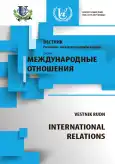БРИКС: эволюция и конвергенция сил
- Авторы: Ягья В.С.1, Чуков Р.С.1, Парфененок Н.Л.1
-
Учреждения:
- Санкт-Петербургский государственный университет
- Выпуск: Том 16, № 1 (2016): "Мягкая сила" в международных отношениях. Образ России
- Страницы: 7-16
- Раздел: СТАТЬИ
- URL: https://journal-vniispk.ru/2313-0660/article/view/339042
- ID: 339042
Цитировать
Аннотация
Осуществление внешней политики государства посредством исключительно классической дипломатии на сегодняшний день представляется малоэффективным. Государства вынуждены использовать дополнительный набор инструментов, которые традиционно находились на пересечении «мягкой» и «жесткой» сил. На волне конвергенции данных концепций происходит зарождение таких стратегий, как «смарт-сила» и «гибридная сила», что системно анализируется в данной статье применительно к такому феномену, как объединение БРИКС.
Об авторах
Ватаняр Саидович Ягья
Санкт-Петербургский государственный университет
Автор, ответственный за переписку.
Email: kafedramp@bk.ru
Кафедра мировой политики факультета международных отношений
Роман Сергеевич Чуков
Санкт-Петербургский государственный университет
Email: roman@chukov.org
Кафедра мировой политики факультета международных отношений
Николай Леонидович Парфененок
Санкт-Петербургский государственный университет
Email: nik-parfenenok@yandex.ru
Кафедра мировой политики факультета международных отношений
Список литературы
- Gromyko A.A. «Myagkaya sila» i sila prava: k postanovke problemy ["Soft power" and the force of law: defining the problem] Vestnik Moskovskogo Universiteta. Seriya 25. Mezhdunarodnye otnosheniya i Mirovaya Politika. [Bulletin MSU. International relations and World Politics], Moscow, 2014, no.3, pp.3-19
- Klimenko S. Teoriya i praktika vedeniya "Gibridnykh voin" (po vzglyadam NATO) [Theory and practice of conducting hybrid warfare "(NATO views)] Zarubezhnoe voennoe obozrenie [Foreign Military Review], 2015, no.5, pp. 109—112
- Lebedeva M.M. Myagkaya sila v otnoshenii Tsentral'noi Azii: uchastniki i ikh deistviyan [Soft power dedicated to Central Asia: the participants and their actions] Vestnik MGIMO- Universitet [Bulletin MGIMO- University], Moscow, 2014, no.2, pp.47-55
- Maikl B., Khartvell K. Nuriev B. Myagkaya sila - palka o dvukh kontsakh [Soft power as the double edged sword] BRICS Magazine, 2014
- Torkunov A.V. Obrazovanie kak instrument “myagkoi sily” vo vneshnei politike Rossii. [Education as the soft power tool in the Russian foreign policy]. Vestnik MGIMO- Universitet [Bulletin MGIMO- University], Moscow, 2012, no.4, pp.85-93
- Filimonov G.Yu. Myagkaya sila kul'turnoi diplomatii SShA [The soft power of US cultural diplomacy], RUDN [PFUR], Moscow, 2010, 242 p.
- Yag'ya V., Minfu L. Institut Konfutsiya kak faktor «myagkoi sily» vo vneshnei politike KNR v XXI veke [Confucius Institute as a factor of "soft power" in China's foreign policy in the XXI century] Mezhdunarodnaya zhizn' [International life], Moscow, 2015, Vol.7
- Yag'ya V.S., Chernov I.V., Kovalevskaya N.V. [Lingvisticheskie izmereniya mirovoi politiki [Linguistic measurement of world politics]], Berlin Golden Mill Germany, 2013 p. 202
- Callahan W.A. Identity and Security in China: The Negative Soft Power of the China Dream. Politics Special Issue: The Soft Power of Hard States, November 2015, Vol. 35, Iss. 3-4, pp. 216–229
- Costa I.L., Pomeroy M., Suyama B. Brazilian South–South Development Cooperation: The Case of the Ministry of Social Development in Africa. Journal of International Development. Special Issue: AID, SOCIAL POLICY, AND DEVELOPMENT. Vol. 27, November 2015, Iss. 8, pp. 1446–1461.
- Folk H. Communicating China to the World: Confucius Institutes and China's Strategic Narratives. Politics. November 1, 2015. pp. 245-258
- Hoffman F.G. Hybrid warfare and challenges. JFQ: Joint Force Quarterly, 2009, pp. 34–48.
- Liao S., McDowell D. Redback Rising: China's Bilateral Swap Agreements and Renminbi Internationalization. International Studies Quarterly, Vol. 59, September 2015, Iss. 3, pp. 401–422
- Mahbubani K. Smart power, Chinese Style. American Interest, March-April 2008.
- Naude W., Szirmai A., Lavopa A. Industrialization lessons from BRICS: A Comparative Analysis. Institute for the Study of Labor. Discussion Paper 7543. Bonn, August 2013, p. 2.
- Nye J. Get Smart. Combining Hard and Soft Power. Foreign Affairs, July 1, 2009.
- Nye J. New public diplomacy. Project Syndicate. 10.02.2010. Available at: http://www.project-syndicate.org/commentary/the-new-public-diplomacy?version=russian&barrier=true (accessed 23.12.2015).
- Parsons T. On the Concept of Political Power. Proceedings of the American Philosophical Society, 1963, Vol. 107, no. 3.
- Peksen D., Peterson T.M., Drury A.C. Media-driven Humanitarianism? News Media Coverage of Human Rights Abuses and the Use of Economic Sanctions. International Studies Quarterly, December 2014, Vol. 58, Iss. 4, pp. 855–866.
- Pocha J. The Rising “Soft Power” of India and China. New Perspectives Quarterly. Vol. 20, January 2003. Iss. 1, pp. 4–13.
- Sergunin A., Karabeshkin L. Understanding Russia's Soft Power Strategy. Politics. Special Issue: The Soft Power of Hard States. Vol. 35, November 2015, Iss. 3-4, pp. 347–363
- Spaniel W., Smith B.C. Sanctions, Uncertainty, and Leader Tenure. International Studies Quarterly. Vol. 59, December 2015, Iss. 4, pp.735–749.
- Weber, M. The Theory of Social and Economic Organization, trans. By A. M. Henderson and T. Parsons. Glencoe: The Free Press, 1947
- Whitaker B.E. Soft balancing among weak states? Evidence from Africa. International Affairs. Vol. 86, September 2010, Iss. 5, pp. 1109–1127
- Wilson J. Russia and China Respond to Soft Power: Interpretation and Readaptation of a Western Construct. Politics. November 1, 2015. pp. 287-300.
Дополнительные файлы









